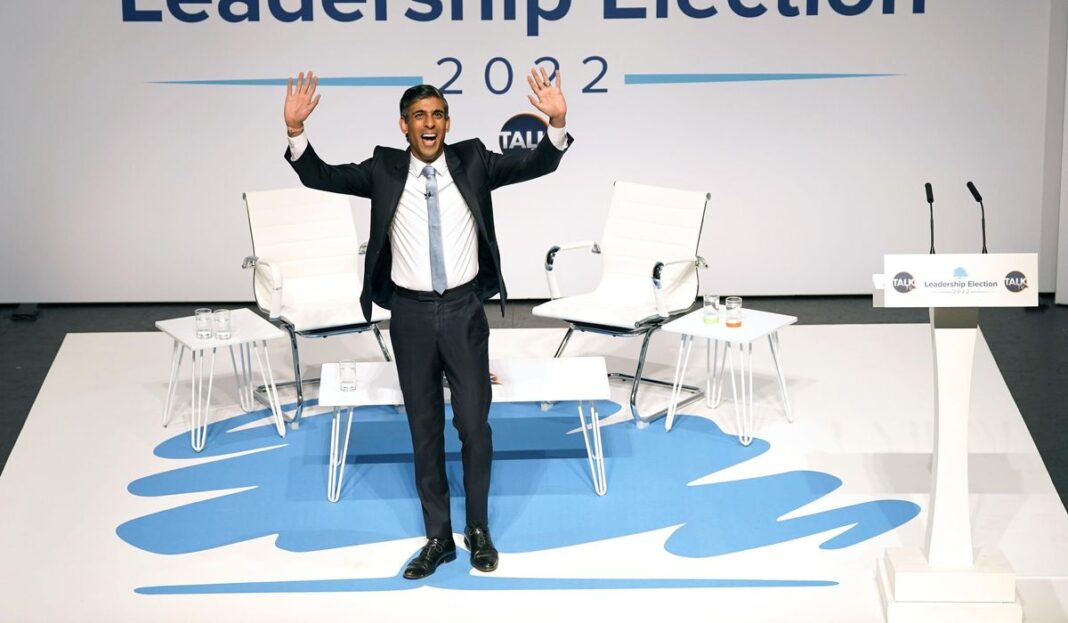
LONDON — It’s not simply the financial system. Whereas inflation and recession fears weigh closely on the minds of voters, one other problem is popping up in political campaigns from the U.Okay. and Australia to the U.S. and past: the “China risk.”
The 2 finalists vying to turn into Britain’s subsequent prime minister, Liz Truss and Rishi Sunak, clashed in a televised debate final month over who could be hardest on China.
It’s a stark departure from outgoing Prime Minister Boris Johnson’s business-focused “Sinophile” method and a part of a hardening of anti-China rhetoric in lots of Western international locations and different democracies, like Japan, that’s popping out in election campaigns.
Nations for years have sought to steadiness selling commerce and funding with the world’s second-largest financial system with considerations about China’s projection of army energy, espionage and its human rights report.
The pendulum is swinging towards the latter, as evidenced in U.S., European, Japanese and Australian opposition to the threatening Chinese language army drills that adopted U.S. Home Speaker Nancy Pelosi’s go to to Taiwan final week, and rising warnings from Western intelligence businesses about Beijing’s snooping and interference.
That shift has made China a goal for vote-seeking politicians as opinion polls present public sentiment in lots of democracies turning towards China. Some candidates blame China for financial woes at dwelling along with posing a safety risk to its neighbors and the broader world.
SEE ALSO: Pompeo: Raid on Trump’s dwelling reveals ‘harmful’ partisan motives in nationwide safety businesses
China loomed giant in Australian’s election in Could by which the conservatives, who finally misplaced, tried to color the opposition as being unwilling to face as much as Beijing.
America’s rising rival on the worldwide stage can also be anticipated to determine on this fall’s U.S. congressional races, significantly in Midwest industrial states, lengthy after former President Donald Trump embraced a fierce anti-China posture.
Many in Europe are additionally rebalancing their method to China, although that didn’t determine considerably in elections in France this 12 months and in Germany in 2021.
Andreas Fulda, a College of Nottingham political scientist specializing in China, stated British politicians “are extra clear-eyed about China” than their European neighbors.
“The U.Okay. has paid shut consideration to what’s taking place in Australia, and in some ways the controversy right here is properly forward of mainland Europe,” he stated.
Truss, the British overseas secretary and the front-runner within the Conservative Social gathering’s management race, has spoken of increasing what she calls a “community of liberty” so democracies can counter China and Russia extra successfully. She says she is going to crack down on Chinese language tech firms such because the proprietor of TikTok, the short-video platform.
In her position as Britain’s high diplomat, Truss has strongly criticized China’s army strikes after Pelosi’s Taiwan go to, accusing Beijing of an “aggressive and wide-ranging escalation” that “threaten(s) peace and stability within the area.”
Sunak, Britain’s former Treasury chief, has pledged to shutter the partially Chinese language-funded Confucius Institutes that promote Chinese language tradition and language at U.Okay. universities, lead a global alliance towards Chinese language cyberthreats, and assist British firms and universities counter Chinese language spying.
“I had a way of déjà vu having simply moved over from Australia,” stated Ben Bland, director of the Asia-Pacific program at London’s Chatham Home assume tank, who beforehand labored on the Lowy Institute in Sydney. “There’s the same ambiance with some politicians attempting to deploy the China risk as a home political software.”
Bland described a dramatic shift in how politicians speak about China in each the U.Okay. and Australia, from a deal with commerce and enterprise ties 5 years in the past to viewing China “by way of the prism of a risk to nationwide safety and financial competitiveness.”
Within the Australian election, conservatives broke from a bipartisanship custom on important nationwide safety points to accuse the center-left Labor Social gathering of being more likely to appease Beijing.
The gambit got here up brief. Labor, whose victory ended 9 years of conservative rule, denied it will shift its China coverage and has referred to as China’s army drills round Taiwan “disproportionate and destabilizing.”
“This isn’t one thing that solely Australia is asking for,” Australian International Minister Penny Wong stated, including the complete area was involved.
A Lowy Institute survey launched in June discovered Australians more and more involved about their nation’s largest buying and selling accomplice. Three-quarters of respondents stated it was no less than considerably doubtless China would turn into a army risk to Australia within the subsequent 20 years, up 30 share factors since 2018.
A Pew Analysis Heart ballot the identical month discovered damaging views of China are at or close to historic highs in lots of the 19 international locations surveyed in North America, Europe and Asia.
Relations between London and Beijing have soured since President Xi Jinping was granted a 2015 state go to the U.Okay. authorities hoped would cement offers to offer Britain an unlimited pool of funding and China higher entry to European markets.
Johnson, who took energy in 2019, at all times burdened that he was not a “knee-jerk Sinophobe” – however beneath stress from the U.S., his authorities excluded Chinese language companies from the U.Okay.’s 5G communications community. Britain additionally has welcomed 1000’s of individuals from Hong Kong as Beijing squeezes the freedoms within the former British colony.
The pinnacle of the MI6 intelligence company, Richard Moore, stated final month that China had overtaken terrorism as its high precedence, as British spies attempt to perceive the threats Beijing’s rising assertiveness would possibly pose.
“That seems like a really massive second, post-9/11,” Moore stated.
The U.S. is also shifting intelligence sources to China.
But China specialists say a lot of the rhetoric from Western politicians is simply political grandstanding.
Steve Tsang, director of the China Institute on the London College College of Oriental and African Research, stated neither candidate searching for to be Britain’s subsequent prime minister has articulated a coherent coverage on China. The winner to be introduced Sept. 5 after a Conservative Social gathering vote.
“The indications are that (Sunak’s) phrases on China coverage aren’t based mostly on any sort of a method,” Tsang stated. “Nor has Truss articulated a correct China technique, regardless of being the present overseas secretary.”
China has pushed again towards the rising hostility.
“I wish to make it clear to sure British politicians that making irresponsible remarks about China, together with hyping the so-called ‘China risk,’ can’t remedy one’s personal issues,” International Ministry spokesperson Zhao Lijian stated after the Sunak-Truss debate.
In america, each main political events have railed towards China on the marketing campaign path, significantly within the Midwest, the place Chinese language imports are blamed for a lack of manufacturing jobs.
Pennsylvania Republican Senate nominee Mehmet Oz ran 1000’s of TV adverts this spring that talked about China. In Ohio, Democratic Senate contender Tim Ryan declared in a single advert: “It’s us vs. China.”
Polling suggests neither China, nor overseas coverage basically, is a top-of-mind problem for many U.S. voters. However political strategists imagine China is more likely to stay a potent political problem within the November U.S. congressional election, as candidates search to hyperlink China to America’s financial challenges.
In Asia, it has been extra nuanced.
Japanese voters have turn into extra supportive of a stronger army following the Russian invasion of Ukraine and the heightening tensions over Taiwan.
Within the presidential vote in South Korea in March, the candidates differed on handle the intensifying rivalry between two vital companions, China and the U.S.
South Korean President Yoon Suk Yeol, who narrowly received, vowed to construct a stronger alliance with the U.S., whereas his liberal opponent argued for a balancing act. However since taking workplace in Could, Yoon has prevented upsetting China, an vital export market.
He didn’t meet Pelosi when she got here to South Korea from Taiwan, although he spoke to her by cellphone, and his authorities has avoided criticizing the Chinese language army strikes across the self-governing island.
___
Related Press writers Jill Lawless in London, Ken Moritsugu in Beijing, Steve Peoples in New York, Rod McGuirk in Canberra, Australia, Kim Tong-hyung in Seoul, South Korea, and Mari Yamaguchi in Tokyo contributed to this report.

